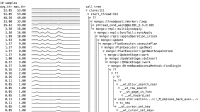-
Type:
Bug
-
Resolution: Done
-
Priority:
Critical - P2
-
Affects Version/s: 3.0.3, 3.0.4
-
Component/s: Performance, WiredTiger
-
Fully Compatible
-
ALL
-
Quint Iteration 7, QuInt A (10/12/15), QuInt C (11/23/15), Repl 2016-08-29, Repl 2016-09-19, Repl 2016-10-10, Repl 2016-10-31
-
None
-
None
-
None
-
None
-
None
-
None
-
None
- hardware: 24 CPUs, 64 GB memory, SSD (all mongods and clients on same machine)
- start 3-member replica set with following options:
mongod --oplogSize 50 --storageEngine wiredTiger --nojournal --replSet ...
Note: repros with journal also, ran without journal to rule out that as a cause.
- Simple small document insert workload: 5-16 threads (number doesn't matter to the repro) each inserting small documents {_id:..., x:0} in batches of 10k
Replica lag grows unbounded as secondaries process ops at maybe 50-80% the rate of the primary.
Some stats of note:
primary

secondary

- op rate on secondary is maybe half that on primary
- ops in flight (i.e. active queues) is much less even on the secondary, although that isn't reflected in the reported op rates
- secondary is executing far more search near calls, about one per document, vs what appears to be about one every 100 documents on primary
Will get stack traces.
- depends on
-
SERVER-19122 Out-of-order _id index inserts on secondary contribute to replica lag under WiredTiger
-
- Closed
-
-
WT-1989 Improvements to log slot freeing to improve thread scalability
-
- Closed
-
-
SERVER-18983 Process oplog inserts, and applying, on the secondary in parallel
-
- Closed
-
-
SERVER-15344 Make replWriter thread pool size tunable
-
- Closed
-
-
SERVER-18982 Apply replicated inserts as inserts
-
- Closed
-
- is duplicated by
-
SERVER-21444 WiredTiger replica set member is getting behind while syncing the oplog during the initialSync
-
- Closed
-
- related to
-
SERVER-19668 Waiting time for write concern increase as time goes by
-
- Closed
-
-
SERVER-21858 A high throughput update workload in a replica set can cause starvation of secondary reads
-
- Closed
-



